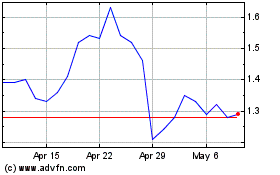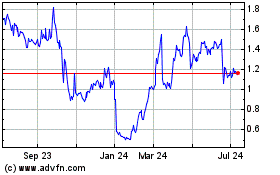SELLAS Life Sciences Group, Inc. (Nasdaq: SLS) (“SELLAS” or the
“Company”), a clinical-stage biopharmaceutical company focused on
the development of novel cancer immunotherapies for a broad range
of cancer indications, announced today final data with up to 6
months follow-up from a Phase 2 randomized trial (the VADIS study)
of the Company’s nelipepimut-S (NPS) in combination with
granulocyte-macrophage colony-stimulating factor (GM-CSF) in women
with ductal carcinoma in situ (DCIS) of the breast who are HLA-A2+
or A3+ positive, express HER2 at IHC 1+, 2+, or 3+ levels, and are
pre- or post-menopausal. This investigator-sponsored trial
randomized patients to receive, prior to surgery, either GM-CSF
followed by NPS two weeks later or GM-CSF alone.
Preliminary data previously reported showed that treatment with
even a single dose of NPS was capable of newly inducing
NPS-specific cytotoxic T-lymphocytes (CTLs) in peripheral blood in
DCIS patients. The updated data, based on a 6-month follow-up,
demonstrate that CD8+ T-cell responses persist long-term post-NPS
treatment, with treated patients retaining and modestly enhancing
their antigen-specific immune response. When compared to baseline
(BL, prior to investigational agent administration), the relative
frequency of NPS-specific CD8 CTLs as a percentage (NPS-CLT%) in
peripheral blood at the 1-month and 6-month post-operative
time-points increased in the NPS+GM-CSF group (n=9) by 11- and
14-fold: 0.01+0.02% [BL] vs. 0.11+0.12% [1-mo] and 0.14+0.12%
[6-mo], respectively, while in the GM-CSF alone group
(n=4) the NPS-CLT% in peripheral blood increased by
only 2.25- and 3.75-fold: 0.04+0.07% [BL] vs. 0.09+0.15% [1-mo] and
0.15+0.03% [6-mo], respectively.
For the NPS+GM-CSF group, the differences in absolute NPS-CTL%
mean values between baseline and 1- or 6-months post-vaccination
were statistically significant, with p-values of 0.039 and 0.0125,
respectively. The relative change in NPS-CTL% mean values at 6
months post-vaccination was +1,300+450% for the NPS+GM-CSF group
vs. 250+150% in the GM-CSF alone group, which was highly
statistically significant in favor of the NPS+GM-CSF group:
p=0.000094.
“These data confirm that NPS confers long-term immune response
in DCIS patients, with continued, and in fact slightly augmented,
antigen-specific T-cell response for up to 6 months
post-vaccination in a randomized setting,” said Angelos M.
Stergiou, MD, ScD h.c., President and Chief Executive Officer of
SELLAS. “One of the main limitations of cancer vaccines has
traditionally been the short duration of the immune response,
especially for CD8+ T-cells. With these new data, we believe that a
single course of NPS treatment can result in robust and lasting
immunity to HER2-expressing breast cancer. In the VADIS study,
immune responses emerged and were sustained even in DCIS patients
with low levels of HER (IHC 1+ or 2+) expression. These data
further support our belief that NPS, by preferentially inducing
adaptive immunity and through its potential synergy with
trastuzumab, enhances cell killing.”
The VADIS study enrolled 13 patients, with nine patients
receiving NPS plus GM-CSF and four patients receiving GM-CSF only.
The NPS-CLT% was measured in the peripheral blood by a sensitive
and specific assay using dextramer staining followed by flow
cytometry, both at baseline (before vaccination or GM-CSF), as well
as at 30 (+7) and 180 (+7) days after surgery. Further data from
additional analyses of select histologic and molecular biomarkers
will be presented in a future scientific meeting.
There were no drug-related unexpected serious adverse reactions
in the study. The overall adverse event profile of the NPS+GM-CSF
combination was similar to the adverse event profile seen with
GM-CSF alone. Almost all patients in both arms experienced at least
Grade 1 toxicities, and the incidence of Grade 2 toxicities was
6.7% in the GPS+GM-CSF arm and 10.7% in the GM-CSF only arm.
“These results further support the case for continued
development of NPS in HER2-expressing breast cancer, as well as
potentially other HER2-bearing cancers,” said Elizabeth A.
Mittendorf, MD, PhD, Rob and Karen Hale Distinguished Chair in
Surgical Oncology, Director of Research, Breast Surgical Oncology
Brigham and Women’s Hospital, Director, Breast Immuno-Oncology
Program Dana-Farber/Brigham and Women’s Cancer Center, and the
Principal Investigator of the VADIS trial. “In patients with DCIS,
a single inoculation with NPS+GM-CSF can induce in vivo immunity
and a continued antigen-specific T-cell response. These data
provide support for further testing of NPS+GM-CSF in the
neoadjuvant and adjuvant settings in an attempt to prevent invasive
recurrence in DCIS,” added Dr. Mittendorf.
About the VADIS spotlight poster presentation
(PD11-09)
The VADIS data will be presented today, December 11, at the
Virtual 2020 Annual San Antonio Breast Cancer Symposium (SABCS)
Title: Vadis trial: phase II trial of
Nelipepimut-S peptide vaccine in women with DCIS of the
breast.Authors: O’Shea AE, Clifton GT, Qiao N, Heckman-Stoddard B,
Wojtowicz M, Dimond E, Bedrosian I, Weber D, Husband A, Pastorello
R, Vornik L, Peoples G, Mittendorf EA. Presenter:
Anne E. O’Shea, MD Poster Discussion No.:
PD11-09Session Date – Time: Friday, December 11,
2020: 2:15 pm – 3:30 pm CSTWebsite:
www.sabcs.org
About the Phase 2 VADIS Trial
This Phase 2
randomized trial is sponsored and operationalized by the National
Cancer Institute (NCI) to study NPS’ potential clinical effects in
earlier-stage disease. Patients are randomized to receive, prior to
surgery, either GM-CSF followed by NPS two weeks later or GM-CSF
alone. The primary endpoint of the trial is the difference in the
frequency of newly induced NPS-cytotoxic T lymphocytes (CTL; CD8+
T-cell) in peripheral blood between the two arms of the study,
using a dextramer assay. Secondary endpoints to be compared between
the two arms include the nature and incidence of adverse events and
in vivo immune response to NPS, in addition to other select
histologic and molecular biomarkers.
About DCIS
DCIS is defined by the NCI as a noninvasive condition in which
abnormal cells are found in the lining of a breast duct and have
not spread outside the duct to other tissues in the breast. DCIS is
the most common type of breast neoplasm with malignant potential.
In some cases, DCIS may become invasive cancer and spread to other
tissues and, currently, it is not possible to know which lesions
could become invasive. Current treatment options for DCIS include
breast-conserving surgery and radiation therapy with or without
tamoxifen, breast-conserving surgery without radiation therapy, or
total mastectomy with or without tamoxifen. Tamoxifen is given in
cases with hormone receptor positivity only. No targeted or immune
therapies have shown any definitive clinical activity in DCIS to
date. The current standard treatment aims at forestalling the
progression of DCIS to invasive cancer. In approximately 15-25% of
cases progression does occur. DCIS is diagnosed in more than 60,000
women each year in the United States, comprising 1 in 5 newly
diagnosed cases of breast cancer.
About SELLAS Life Sciences Group, Inc.
SELLAS is a late-stage clinical biopharmaceutical company
focused on the development of novel cancer immunotherapeutics for a
broad range of cancer indications. SELLAS’ lead product candidate,
galinpepimut-S (GPS), is licensed from Memorial Sloan Kettering
Cancer Center and targets the WT1 protein, which is present in an
array of tumor types. GPS has potential as a monotherapy or in
combination to address a broad spectrum of hematologic malignancies
and solid tumor indications. SELLAS’ second product candidate, NPS,
is a HER2-directed cancer immunotherapy with potential for the
treatment of patients with early stage breast cancer with low to
intermediate HER2 expression, otherwise known as HER2 1+ or 2+,
which includes triple negative breast cancer patients, following
standard of care.
For more information on SELLAS, please
visit www.sellaslifesciences.com.
Forward-Looking Statements
This press release contains forward-looking statements. All
statements other than statements of historical facts are
“forward-looking statements,” including those relating to future
events. In some cases, forward-looking statements can be identified
by terminology such as “plan,” “expect,” “anticipate,” “may,”
“might,” “will,” “should,” “project,” “believe,” “estimate,”
“predict,” “potential,” “intend,” or “continue” and other words or
terms of similar meaning. These statements include, without
limitation, statements related to the clinical development of NPS
for breast cancer, including DCIS, and the potential for NPS as a
drug development candidate. These forward-looking statements are
based on current plans, objectives, estimates, expectations and
intentions, and inherently involve significant risks and
uncertainties. Actual results and the timing of events could differ
materially from those anticipated in such forward-looking
statements as a result of these risks and uncertainties, which
include, without limitation, risks and uncertainties associated
with immune-oncology product development and clinical success
thereof, the uncertainty of regulatory approval, and other risks
and uncertainties affecting SELLAS and its development programs as
set forth under the caption “Risk Factors” in SELLAS’ Annual Report
on Form 10-K filed on March 13, 2020 and in its other SEC filings.
Other risks and uncertainties of which SELLAS is not currently
aware may also affect SELLAS’ forward-looking statements and may
cause actual results and the timing of events to differ materially
from those anticipated. The forward-looking statements herein are
made only as of the date hereof. SELLAS undertakes no obligation to
update or supplement any forward-looking statements to reflect
actual results, new information, future events, changes in its
expectations or other circumstances that exist after the date as of
which the forward-looking statements were made.
Investor ContactsAdam HoldsworthPCG
Advisory917-497-9287adamh@pcgadvisory.com
Investor RelationsSELLAS Life Sciences Group,
Inc.917-438-4353info@sellaslife.com
SELLAS Life Sciences (NASDAQ:SLS)
Historical Stock Chart
From Mar 2024 to Apr 2024

SELLAS Life Sciences (NASDAQ:SLS)
Historical Stock Chart
From Apr 2023 to Apr 2024
